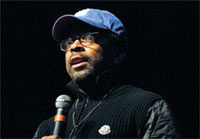CAMPUS
BUZZ
Buzz Words
What campus visitors are saying
Forest Whitaker discusses prejudice

Academy Award-winning actor Forest Whitaker says everyone judges and separates, and these differences create definitions and problems.
Whitaker offered his views on prejudice in March at Texas Hall in conjunction with the University’s OneBook program.
The soft-spoken Texas native grew up in a rough area of California where he saw neighbors killed. Life can be hard on dreams, he said, and sometimes people sabotage themselves. He remembers segregated restrooms and school busing issues.
Biases against gender, economic status, sexuality and age abound, he told the audience of more than 1,000. As an auditioning actor, he encountered a variety of prejudices.
“I was a real college football player when I tried out for my first film. But the director told me I didn’t look like one; that I wasn’t big enough and I was too smart.”
Whitaker won that role in Fast Times at Ridgemont High (1982), only to face discrimination at future auditions. Directors said he was too soft to play the bad guy, not intelligent enough to play a doctor.
He kept campaigning to do multiple roles and, in 2007, won the Best Actor Academy Award for his portrayal of Ugandan dictator Idi Amin in The Last King of Scotland. Whitaker is among a select group of African-American actors with a star on Hollywood Boulevard.
“When you start defining things, that creates desires. Desires fuel how you view the world. Prejudice comes from something inside you,” said Whitaker, who answered questions from the audience and signed autographs following the lecture.
Through the OneBook program, freshman English classes read the same book. This past year’s selection, Maus: A Survivor’s Tale, focused on prejudice (see story: 'OneBook's prejudice theme teaches lessons').
Spike Lee emphasizes student dreams

Independence, education and happiness were the themes of filmmaker Spike Lee’s lecture at Texas Hall in February.
Part of Black History Month events, the twice Oscar-nominated producer’s appearance followed a weeklong campus film festival and concert that focused on his movies.
Lee talked about life’s challenges and told the crowd that a strong work ethic and careful career selections would define their futures.
“You must be strong enough to tell the people you love what is, or is not, your calling,” he said. “Stand up and make your choice.”
Studying and using college years to discover what truly brings happiness should be priorities, he said, adding that careers span many years-and that’s too long to pursue anything less than your dreams.
“The people who are happy choose their own path,” he said. “I give thanks because I am doing what I love.”
Lee was born in Atlanta in 1957 and moved to Brooklyn, N.Y., as a child. His father was a jazz musician and his mother a teacher. He earned a bachelor’s degree from Morehouse College in Atlanta, then developed his filmmaking skills at Clark Atlanta University. He graduated in 1978 from the Tisch School of Arts with a master’s degree. He teaches at New York University and Columbia University.
He produced a 45-minute film in 1983 that won a student Academy Award, but to his surprise, success did not bring money. His utilities were disconnected and he received an apartment eviction notice before he realized he needed to work harder. Now, 35 films later, Lee describes his works as pointed political messages, insightful and different. His movies frequently examine African-American themes.
“I grew up going to the movies every Saturday,” he said. “The people I saw in my community were not represented on the screen. As a filmmaker, I wanted to change that.”
Do the Right Thing (1989) was nominated for an Academy Award for Best Original Screenplay. In 2006 he directed and produced When the Levees Broke: A Requiem in Four Acts, a documentary about life in New Orleans after Hurricane Katrina.
— Jenny Blankenship
Other Stories
Deep thinkers
Pilot projects encourage students to take charge of their own learning
Mavericks Personified: Wajiha Rizvi
Recent graduate takes a campaign detour
Family Friendly
Dan and Grace Cruz never dreamed they'd one day attend college alongside sons Mike and Nick. It's hectic but worth it, they all say.
Arctic exploration
Researchers examine Alaskan tundra for insight into climate warming
What’s in a name?
Building namesakes include former presidents, deans, coaches and an astronaut
Contact Us
Office of University Publications
502 S. Cooper St.279 Fine Arts Building
Box 19647
Arlington, TX 76019-0647
